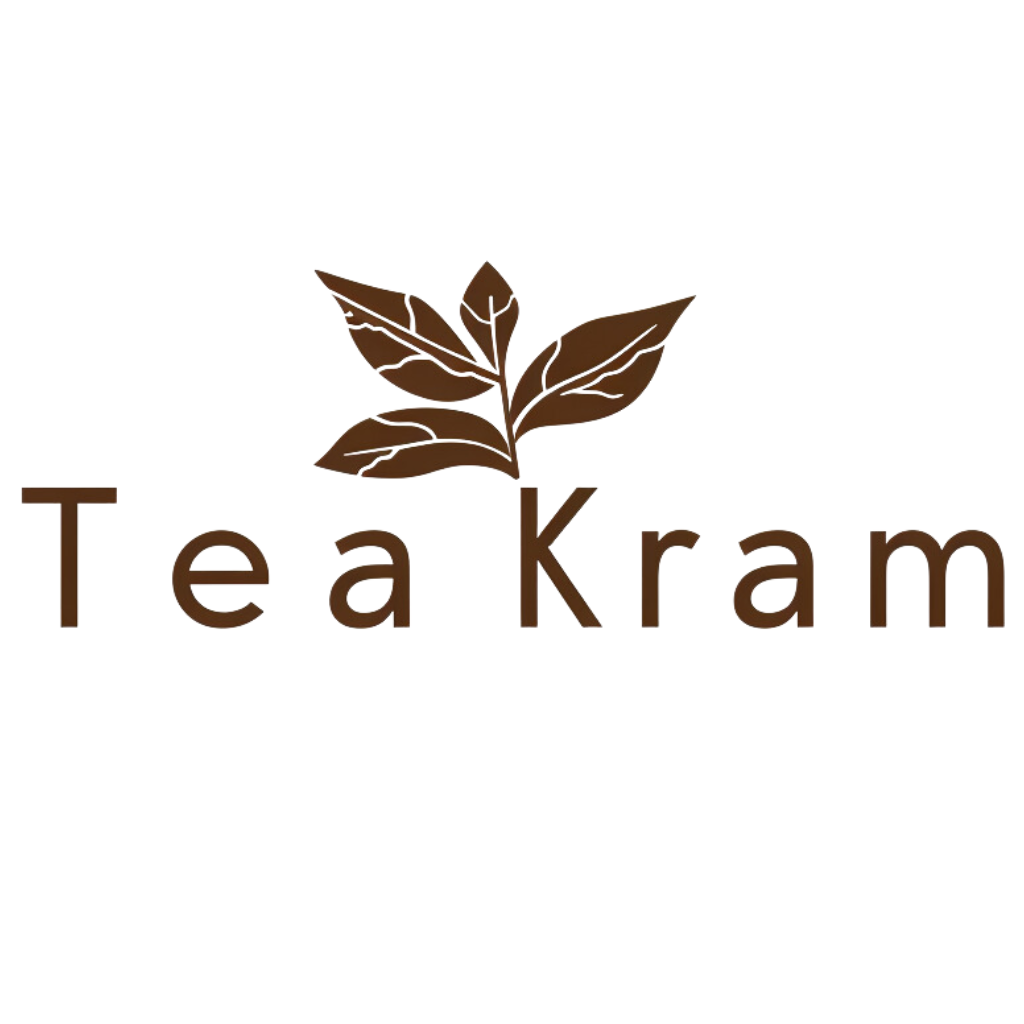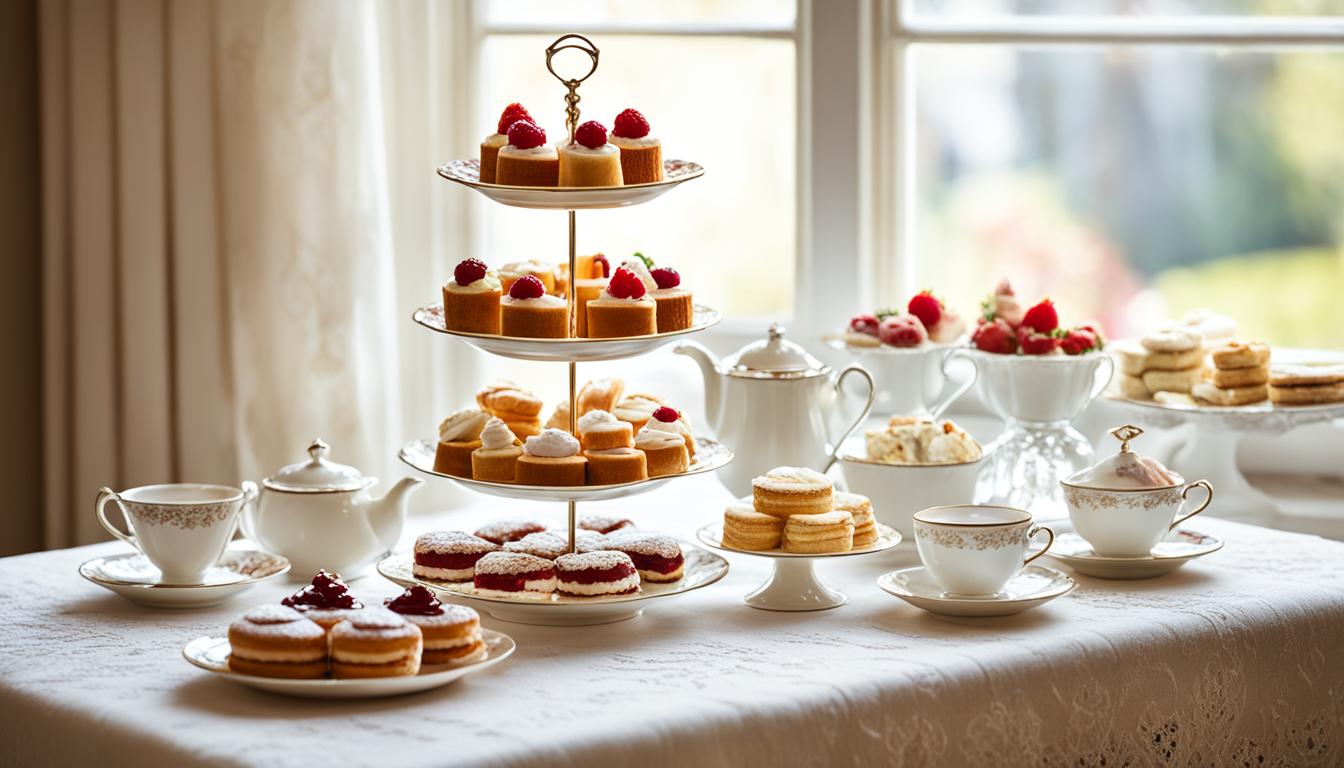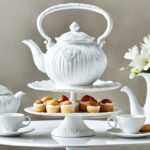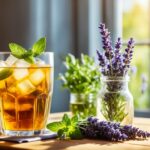Enveloped in the elegant folds of British tea culture, The British Afternoon Tea stands as a revered emblem of grace and refinement. Embarking on the journey of this quintessential tradition unravels a narrative steeped in history, where every sip echoes the genteel pastimes of bygone eras. As one of the best afternoon tea experiences in Britain, it remains an intricate part of the nation’s heritage, inviting enthusiasts and the curious alike to partake in a ritual that has been savored for centuries. For those seeking to immerse themselves in a quintessentially British experience, afternoon tea provides a luxurious escape into the world of aristocratic indulgences and the fascinating tea history that shaped them.
Key Takeaways
- Understanding the historical significance behind The British Afternoon Tea as a testament to Britain’s cultural tapestry.
- Recognizing afternoon tea as a quintessential tradition amidst the diverse customs of British tea culture.
- Discovering what distinguishes the best afternoon tea in Britain from ordinary tea-drinking experiences.
- Exploring the rich tea history that has brewed alongside the evolution of this cherished British practice.
- Appreciating the social and cultural nuances that make afternoon tea a unique and timeless adventure in British sophistication.
The British Afternoon Tea: A Quintessential Tradition
The very essence of British leisure and sophistication, The British Afternoon Tea, is steeped in a rich history that traces its origins to the early 19th century. Initially an exclusive pastime for the aristocracy, this quintessential tradition has evolved to become a beloved facet of British tea culture, engaging a diverse array of social strata across the nation. Over time, it has finely woven itself into the fabric of society, emerging as a cherished ritualistic pause within the bustling modern life.
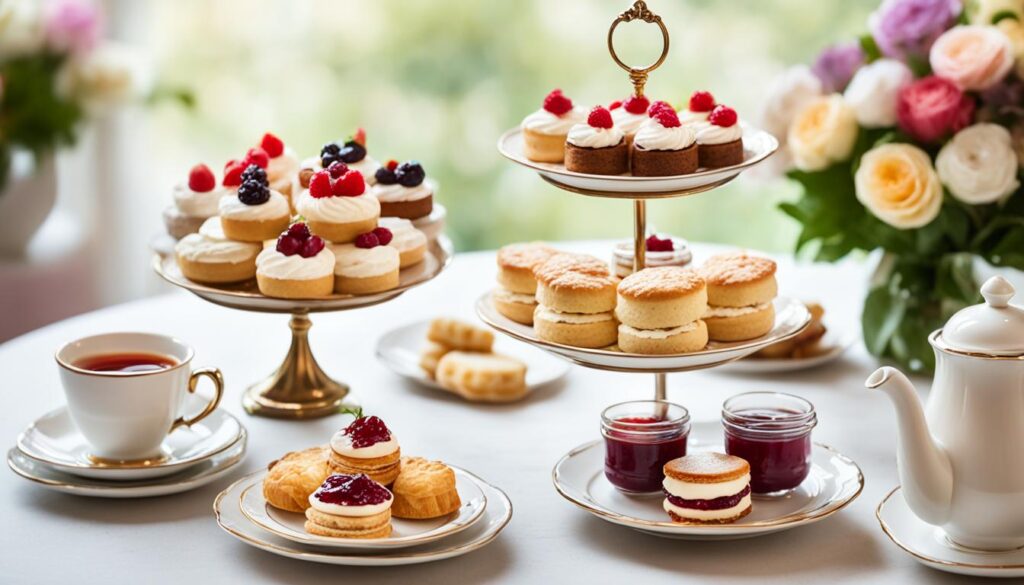
The Origins and Evolution of Afternoon Tea
In the 1800s, Anna, the Duchess of Bedford, introduced the custom of enjoying a light repast between lunch and dinner—a practice that has since captivated the imagination and palates of countless enthusiasts. From its aristocratic roots, this leisure activity has blossomed into a widespread custom, democratizing the afternoon tea experience. By melding the rigid lines of social hierarchy and making the enjoyment of tea and its accompaniments a shared pleasure, the tradition has both preserved and adapted its allure, securing its legacy as an emblem of cultural identity.
Understanding the Cultural Significance
The British Afternoon Tea is more than a mere culinary event; it is an interactive cultural tapestry where stories are woven and memories are crafted. It stands as a representative of British tea culture, shaping perceptions and evoking a sense of national pride that resonates beyond the United Kingdom’s borders. Whether it’s a routine gathering of friends or a celebration, the afternoon tea experience remains a versatile backdrop for life’s moments—both ordinary and extraordinary.
Key Components of the Classic Afternoon Tea
Each afternoon tea is an intimate affair with a curated tea menu and an array of authentic tea accompaniments. The selection of teas spans from the robust flavors of Assam to the delicate notes of Earl Grey, each complementary to assorted finger sandwiches, scones with clotted cream and jam, and a graceful array of pastries. These time-honored components form the bedrock of the classical afternoon tea experience, engaging the senses and igniting a passion for the continued celebration of this enduring quintessential tradition.
The Art of Tea Etiquette and Ceremony
Embracing the quintessential tradition of British afternoon tea extends beyond simply enjoying a cup of tea; it is about immersing oneself in the depth of British tea culture revealing this ritual’s both charming and ceremonious aspects. Whether you’re stirring a steaming cup of Earl Grey or delighting in a scone with clotted cream, tea etiquette is key to enriching your afternoon tea experience.
Mastering Afternoon Tea Manners
At the heart of British tea culture is the unwritten code of tea etiquette. A true afternoon tea experience is marked by a tapestry of manners that distinguishes this elegant pastime. Guests are encouraged to engage in polite conversation, making sure not to overshadow the soft clinking of china and gentle sips of tea. Every action from passing the milk to the fold of your napkin is a subtle ballet of courteous gestures honoring the tradition.
- Polite conversation: Topics should steer clear of anything considered taboo or raw; afternoon tea is a light-hearted affair.
- Table manners: They are paramount—no elbows on the table, and scones must be broken by hand, not sliced with a knife.
- Tea and food enjoyment: Take small bites and sips, savoring each treat’s flavor and respecting the serene ambiance of the tea ceremony.
The Correct Way to Sip and Serve
The tea ceremony itself is an intricate dance of small but significant rituals passed down through generations. The act of pouring tea into a fine bone china cup becomes a gesture of grace and respect for the blend’s rich heritage. When adding milk, it follows after the tea, complementing not overpowering, and sugar is dispensed with tongs, never by the hand.
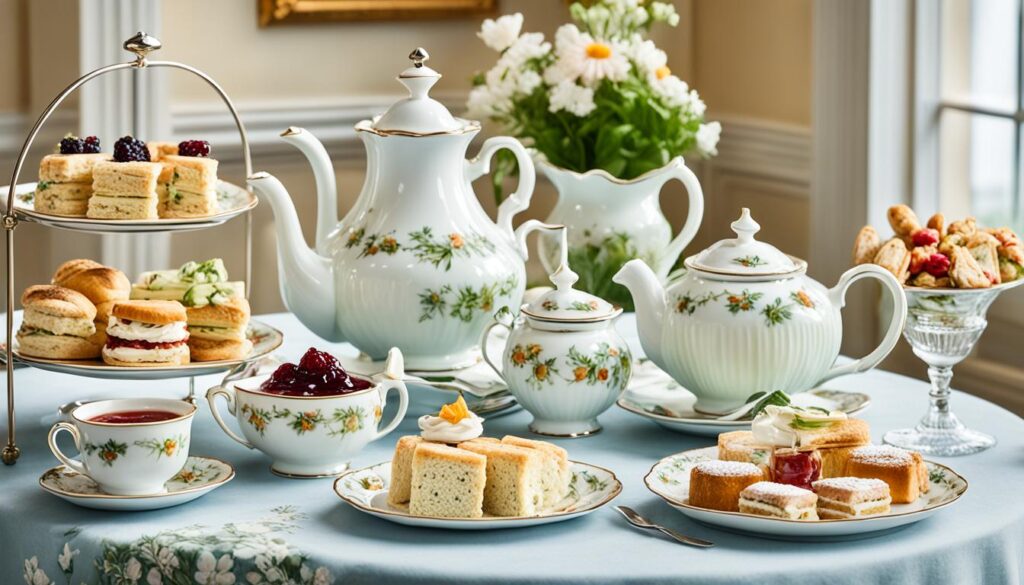
The correct handling of teaware is an element of the afternoon tea experience that is subtle yet complex. There is a measured grace in holding the teacup by the handle without allowing one’s fingers to pass through it, a practice that is emblematic of tea etiquette.
Dressing for the Occasion
The allure and picturesque ambiance of afternoon tea are equally expressed in the attire of its participants. While formal wear has been the traditional standard, with women donning dresses and hats and men opting for suits, there is now a welcome blend of classic and contemporary fashions. The objective remains: to reflect the event’s sophistication through one’s sartorial choices without compromising personal style and comfort.
| Traditional Attire | Modern Interpretation |
|---|---|
| Full-length dresses | Elegant day dresses |
| Three-piece suits | Smart casual blazers |
| Hats and gloves | Statement accessories |
Whether upheld with steadfast adherence to the traditional dress code or tempered by a modern twist that nods to changing times, what stands unwavering is the quintessential tradition feeding into the celebrated British tea culture. Altogether, they spin the thread that continues to weave the rich tapestry of the British afternoon tea experience.
Exploring the Tea Menu and Accompaniments
The quintessential British afternoon tea is an experience as much about the atmosphere and company as it is about the delicate pastries, sandwiches, and, of course, the tea itself. The meticulously crafted tea menu is a central feature of this storied tradition, offering a curated selection of blends that range from the robust to the refined. To truly appreciate the best afternoon tea in Britain, one must delve into the artistry and origins defining each cup’s character.
Among the traditional teas, you will find the bold and malty flavors of Assam, the citrusy notes of Earl Grey, and the subtle floral hints of Darjeeling. Each has its place on the tea menu, ready to be paired with a symphony of tea accompaniments that are both a delight to the palate and a feast for the eyes.
- Assam – A rich, full-bodied tea with a robust taste, perfect with milk and sugar.
- Earl Grey – Known for its citrusy bergamot aroma, Earl Grey is a fragrant choice for those who enjoy a lighter tea.
- Darjeeling – Often referred to as the “champagne of teas”, Darjeeling offers a delicate muscatel flavor distinctive to its Himalayan terroir.
Accompanying these central pours are an assortment of scones, clotted cream, and jams—scones being the essential canvas for combining sweet and creamy accents. The offering continues with a selection of bite-sized sandwiches showcasing classic fillings such as cucumber, smoked salmon, and egg-mayonnaise with cress. Not to be overlooked are the petits fours, macarons, and fruit tartlets, whose vibrant flavors and textures are carefully chosen to contrast and complement the tea.
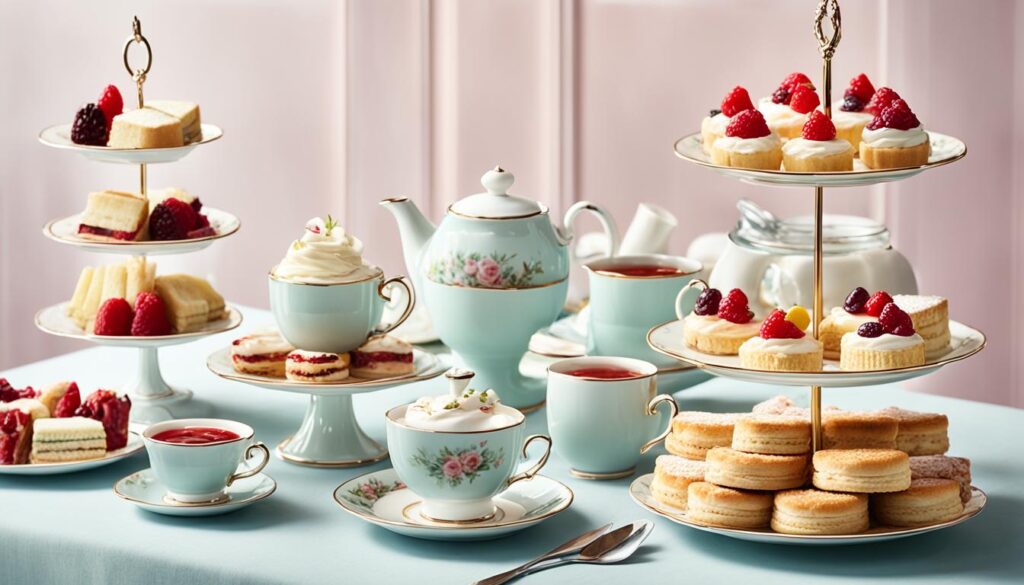
Whether you’re savoring the best afternoon tea in Britain amidst the sprawling gardens of a country estate or in the plush surrounds of a historic hotel, the fusion of the tea menu’s offerings with traditional accompaniments promises an enchanting rendezvous with history and taste.
The British afternoon tea isn’t just a meal; it’s a touchstone to a storied past, a celebration of the present, and a nod to the art of taking time to relish life’s little luxuries.
Conclusion
The tapestry of The British Afternoon Tea is woven with the threads of a quintessential tradition that elegantly drapes over the framework of British tea culture. Its allure lies not merely in the fine teas and the delicate pastries that accompany them but in the refined ambiance and the ritualistic celebration of togetherness it fosters. Embracing the afternoon tea experience is to partake in a practice that has charmed generations, an unwavering symbol of British identity that ally of bonds old and new.
This storied custom offers a tranquil pause in the day, a time where conversations flow as smoothly as the poured tea. It’s an opportunity to slow down and relish the company of friends and family within an atmosphere of casual elegance. Whether it is in a grand hotel or in the quiet confines of a cozy home, the spirit of The British Afternoon Tea remains undiminished, a testament to its time-honored stature within the myriad of British traditions.
We invite you to immerse yourself in this esteemed cultural practice, to appreciate the intricate nuances, and to create your own unforgettable memories over a cup of tea. As you navigate the path of learning the proper etiquette, selecting your teas, and assembling the perfect accompaniments, know that you are partaking in a ritual that exemplifies the grace and hospitality intrinsic to British tea culture. Let the next sip you take be a step into history, as you savor the quintessence of a nation’s legacy that is The British Afternoon Tea.
FAQ
What is The British Afternoon Tea?
The British Afternoon Tea is a quintessential tradition deeply rooted in British tea culture. It’s a unique and elegant experience that typically involves enjoying a selection of teas, finger sandwiches, scones with clotted cream and jam, and an assortment of sweets and pastries in the afternoon.
How did The British Afternoon Tea tradition start?
Afternoon Tea began in the early 19th century, introduced by Anna, the Duchess of Bedford. It evolved from a private social event for the aristocracy to a widespread tradition enjoyed across various social classes in Britain, retaining its symbol of sophistication and leisure.
What does the cultural significance of Afternoon Tea in Britain?
The British Afternoon Tea is emblematic of British culture and identity, often associated with British sophistication, hospitality, and the leisurely enjoyment of tea. This tradition plays a prominent role in social functions, business meetings, and special occasions, and it is cherished in daily life as well as in celebrations.
What are the key components of a classic Afternoon Tea?
The key components of a classic Afternoon Tea include an array of loose-leaf teas, delicate finger sandwiches with various fillings, freshly baked scones served with clotted cream and jam, and a selection of pastries and desserts. These elements are often elegantly presented on a tiered cake stand.
Can you explain the basic tea etiquette for Afternoon Tea?
Basic tea etiquette includes using tea-specific tableware properly, stirring your tea gently without clinking the cup, eating finger foods gracefully, and engaging in polite conversation. It’s important to respect the tradition while enjoying the food and company.
How should I dress for an Afternoon Tea ceremony?
It’s recommended to dress smartly for an Afternoon Tea ceremony. While the formality can vary by venue, smart casual attire is generally acceptable. Women can wear dresses or skirts with blouses, and men can opt for chinos or trousers with a collared shirt. The aim is to reflect the elegance of the occasion.
What types of tea are typically included in an Afternoon Tea menu?
An Afternoon Tea menu typically includes a selection of black teas such as Earl Grey, Assam, and Darjeeling, green teas, and often herbal infusions like chamomile or mint. Each type of tea offers a different flavor profile and is chosen to complement the food offerings.
Where can I experience the best Afternoon Tea in Britain?
Britain boasts many venues renowned for their excellent Afternoon Tea experience, from luxury hotels in London like The Ritz and Claridge’s to quaint countryside tea rooms. Each venue puts its own spin on the experience, offering a range of teas and accompaniments reflective of their culinary style.
